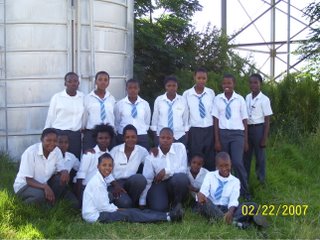 Many a dream has been thwarted by a lack of confidence.
Many a dream has been thwarted by a lack of confidence.The problem crosses cultural and gender divides. According to a University of Wisconsin study, males score only slightly higher on global measures of self-esteem than females.
But for women in Botswana, a lack of confidence in their worth and abilities doesn’t just affect the shape of their dreams. It’s a life and death matter.
An estimated one in three Botswanan citizens between the ages of 15 and 49 is infected with the HIV virus. And because Botswanan women generally don't have a say about how and when they have sex, practicing the ABCs of HIV prevention (abstinence, being faithful, and condomizing) is especially difficult.
In an article appearing in this month's Pennsylvania Gazette (the alumni magazine of the U. of Pennsylvania), Dr. Musa Dube, an associate professor of theology and religious studies at the University of Botswana, describes the emotional toll:
"When we kiss and make love, the enemy is there. It is now in our veins, in our blood, in our cells, in our fluids, in our minds. HIV/AIDS makes love drag us to death."
The bright spot among this grim reality is that cultural attitudes about sex are slowly beginning to shift in Botswana; and with that shift, women are starting to find their voices.
 The group of schoolgirls pictured at left attend a community school in Good Hope, Botswana that I spoke at in February. The 15 girls pictured at the top of this posting are from the same school. They belong to the Peace Corps-sponsored GLOW Club (“Teaching Girls to Lead Our World”) that sponsored my visit.
The group of schoolgirls pictured at left attend a community school in Good Hope, Botswana that I spoke at in February. The 15 girls pictured at the top of this posting are from the same school. They belong to the Peace Corps-sponsored GLOW Club (“Teaching Girls to Lead Our World”) that sponsored my visit.These young women are some of the most poised and self-assured teenagers I have ever met. My hope, and surely their teachers’ hope, is that they will be as assertive in the bedroom as they are in the classroom.
Their dreams are as lofty as yours and mine. But they have to be alive for those dreams to come true.
No comments:
Post a Comment